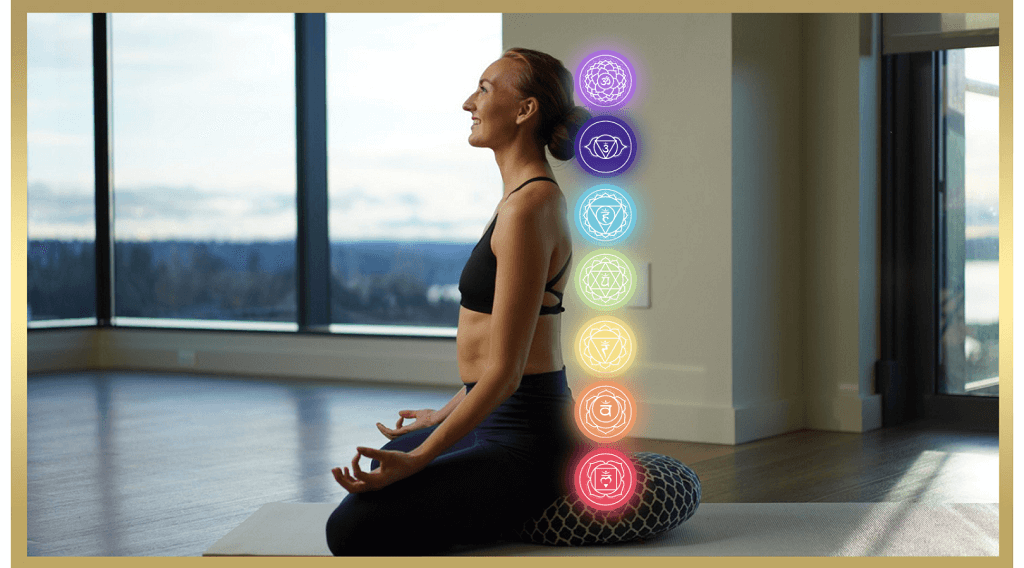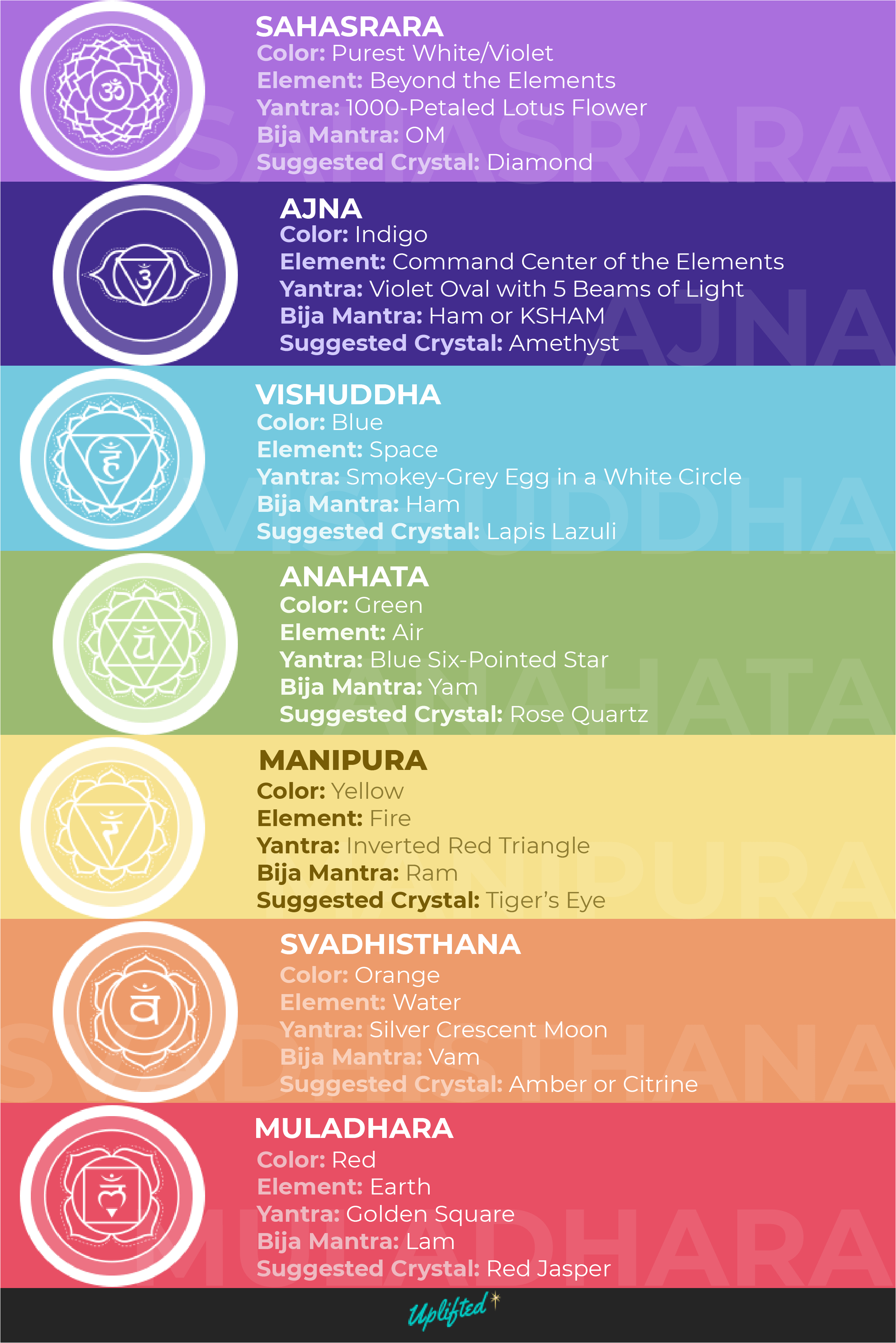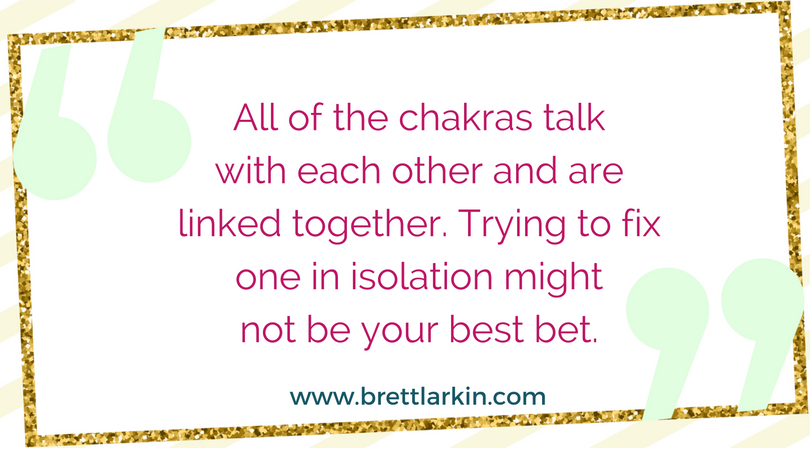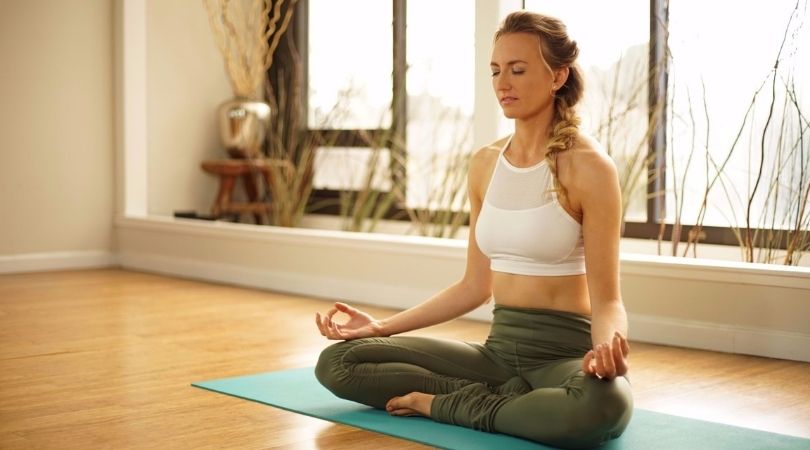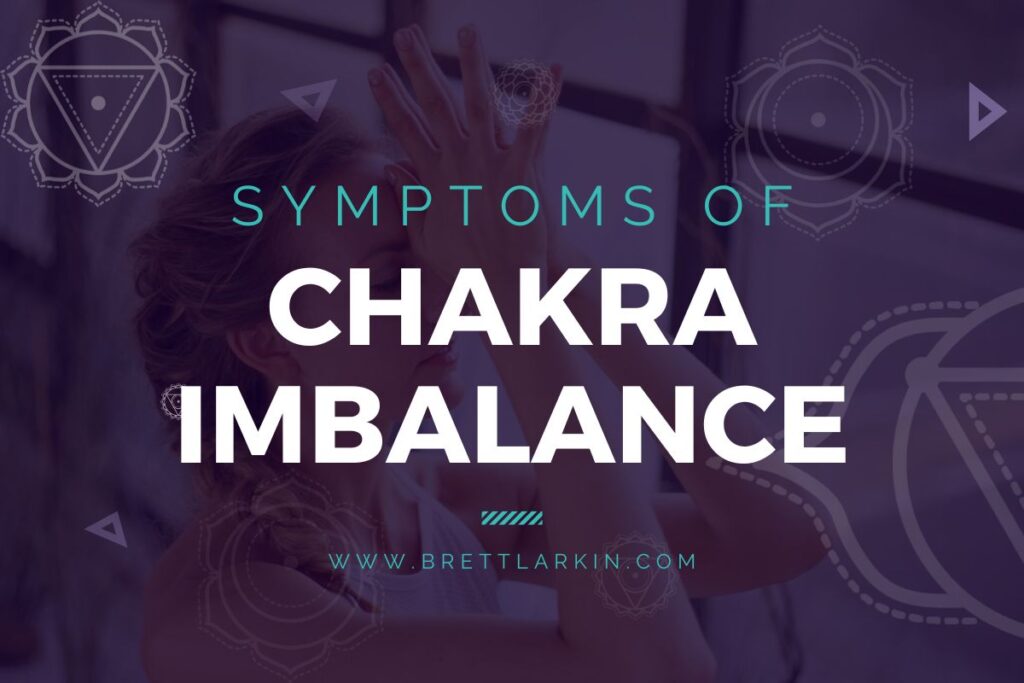
Did you know that your chronic fatigue or sinus issues could be a physical manifestation of an energetic problem? Or that knee pain can come from feeling a lack of safety or security? Don’t roll your eyes, because it’s true! When you’ve got chakra imbalances it not only affects your energetic body, but your emotional and physical body as well. Keep reading to learn how these energy centers show imbalance and things you can do to help.
Understanding Chakra Imbalances
In order to understand chakra imbalance symptoms you need to understand the chakras and the qualities associated with each one. So let’s break down this fascinating energy system by looking at each energy center individually.
1. Root Chakra – Muladhara
The root chakra sits right at the base of your spine, on your coccyx, think of Muladhara as the base or root of your whole chakra system — it supplies prana to the rest of the body, mind and spirit. In Sanskrit then first chakra, Muladhara chakra, means “support” or “pillar”. It’s said that half of the root chakra is outside of the body, grounding you into the earth. This is where Kundalini energy begins and enters the body.
- Sanskrit meaning: “Root Support”
- Color: Red. Red has the densest vibration of all the colors, and is the most stimulating. It immediately pulls your attention; think of how you feel when you see a stop light, or blood. The root chakra signals warnings and dangers immediately, and we act accordingly. It is life force, courage, and vitality.
- Key themes: Basic survival. Fight or flight, instinct, stability, material safety, trust, and security. The root chakra also impacts our passion, physical strength, and sexuality.
2. Sacral Chakra – Svadhisthana
Located just above the sexual organs and beneath the navel, right above the root chakra, the sacral chakra is the center of your creative and joyful experiences. The root chakra gives you the stability to explore, and the sacral chakra is the joy and enthusiasm that drives you to do it. The svadhisthana chakra transforms the root chakra’s earth energy and uses it for creativity and pleasure. It is a feminine, flexible, vital energy connected to your feelings of bliss — but not just hedonism! Too much of a good thing can be irritating; even destructive. The sacral chakra also connects you to inner wisdom, stillness and personal development, as well.
- Sanskrit meaning: “Your own seat,” or “One’s own place.”
- Color: Orange. Orange is enthusiastic, joyful, and the color of vitality and strength. It is equally red and yellow (rooted and powerful). It is sensual and associated with Tantra, the practice of moving kundalini energy up the spinal column to attain enlightened states.
- Key Themes: Water, procreation, sensuality, creative expression, compassion, pleasure, gut feelings, and wisdom. The sacral chakra is healing and compassionate.
3. Solar Plexus Chakra – Manipura
The third chakra, ManiPura chakra, or solar plexus, is the seat of the power that you walk with through the world and the primary source of your personal and professional success. It is your willpower and self-control, self respect, and respect for others. The solar plexus chakra is also associated with your ability to know yourself — your personality — and feel confident in how you walk through the world. The solar plexus chakra is located in the belly, just below the heart.
- Sanskrit meaning: “Jewel city”
- Color: Yellow. The strength of yellow shines bright like the uncovered sun, and illuminates the “I” — your sense of self.
- Key Themes: Self-esteem, inner fire. Willpower, and a driving force. Like an engine that is humming. Leaving your mark on the world. Optimism, youth, intellect, and compassionate warmth.
4. Heart Chakra – Anahata
The heart chakra is the center of your being. It is the one chakra that connects the three lower physical-emotional main chakras to the three higher mental and spiritual main chakras, where they can be transformed and integrated into a higher vibration. It is where we vibrate with love, not only for our personal relationships, but for all beings.
- Sanskrit meaning: “Unhurt,” unstruck, immaculate, unspoiled.
- Color: Green. The color of life; naturally calming, healing, and supportive.
- Key Themes: Love. Openness, self-acceptance, self compassion, and the acceptance of others. Empathy resides in this chakra, and selfless love for all beings.
5. Throat Chakra – Vishuddha
The throat chakra asks us to vibrate higher; to synthesize, create, and express thoughts and feelings. It is conscious creation, as opposed to the orange creation that happens without consciousness.
The throat chakra is how we express who we are to the world. The Sanskrit word “Vishuddi” means “especially pure,” pointing to how this chakra vibrates highest when it’s unbound, honest, and without reservation.
- Sanskrit meaning: “Especially pure”
- Color: Blue. The blue, unclouded sky of pure existence. Blissful, clear, calm, and true, blue is where things slow down and you can listen to the still waters within for the truth.
- Key Themes: Communication, listening, expression of the self, how we understand and are understood. Independence, truth.
6. Third Eye Chakra – Ajna
The third eye chakra is our connection to the spiritual world. It vibrates with the esoteric, spiritual phenomena that can become available to you once all of the lower chakras are clear and activated. Ajna brings deeper understanding of things; insights and connections that are always there but not always sensed.
- Sanskrit meaning: “knowledge”
- Color: Indigo, also called royal blue, is the color of night — there is a depth of awakening and change in this color that connects us to space and time.
- Key Themes: Intuition, insight, “sixth sense,” psychic abilities, self knowledge, imagination.
7. Crown Chakra – Sahasrara
The crown chakra, also known as the crown lotus, or the thousand-petaled lotus, is the most subtle of the chakras. Located at the top of the head, where a crown would sit, near to the cerebral cortex. It is the culmination of awakening Kundalini energy in all the chakras, which rises up the spine to the crown chakra and causes spiritual awakening.
- Sanskrit meaning: “Thousand-Petaled”
- Color: Violet, the highest vibrating color, is one of magic, purification, and mystery that brings together the polarities of the world. This chakra is also associated with white and gold.
- Key Themes: Cosmic awareness, higher consciousness, faith, spiritual power, connectedness to all beings.
You can go so much deeper with this energy system in my 300-hr Yoga Teacher Training where you’ll be taught by world renowned expert Anodea Judith!!
Chakra Imbalance Symptoms
When it comes to imbalance you may not always be able to pinpoint a singular cause. Blockages or imbalance can be caused by any type of disturbance to the mind, the body, or the spirit. This could include a physical ailment, like a flu, or an emotionally traumatic event, like the death of a loved one. But, it can even be as simple as excessive life stress or just the growing pains of life.
Now you’re probably wondering how you can tell which energy center is out of balance and why? Here are some physical and emotional symptoms of chakra imbalance for the seven major chakras to help you troubleshoot:
1. Root Chakra – Muladhara
- Laziness, narcissism, and existential dread.
- Negative energy, over-worrying, rage and resentment build.
- You may find yourself clinging to those who project a sense of safety.
Physical issues might include:
- Colon pain, constipation, sciatica, lower back pain, hemorrhoids, prostate issues, or menstrual cramps.
- Knee pain, degenerative arthritis. Feeling heavy, chronic fatigue, lethargic, or tired.
2. Sacral Chakra – Svadhisthana
- Poor boundaries, especially sexual ones, are a big red flag of an imbalanced sacral chakra.
- Lack of control around your sexual urges, or, extremely repressed about sex and your body.
- Jealousy, fear, sexual dysfunction, obsessive or strong emotions and attachments, or feeling detached from one’s soul or self.
Physical symptoms might include:
- Urinary problems, kidney dysfunctions, sexual and reproductive issues.
- Mood swings, addictions, rigidity or restrictive movement.
3. Solar Plexus Chakra – Manipura
- Fear transformed into pent up aggression, needing the last word, and competing with others in an unbalanced way.
- Poor sleep and you often feel stressed and have nightmares.
- Blaming others for your failures or bad luck, stubborn, dominant, and manipulative.
- Criticism causes you to spiral into obsessive worry and anger.
Other physical symptoms include:
- If deficient: poor digestive fire or digestive problems, low energy/chronic fatigue, attraction to stimulants
- If excessive: aggression, hyperactivity, attraction to sedatives.
- Liver dysfunction, eating disorders, stomach ulcers.
4. Heart Chakra – Anahata
- Loneliness and isolation, dysfunctional relationships (jealousy, criticizing, fear of rejection), and/or co-dependence and clinginess.
- Intellectualizing problems and criticizing or cruelty.
- Fear of intimacy and withdrawing, overly self sacrificing/poor boundaries or narcissistic qualities.
Physical issues associated with heart chakra:
- Lung disease, lowered immune system leading to colds and flus.
- High blood pressure and respiratory problems, heart palpitations, poor circulation, upper back and shoulder pain.
5. Throat Chakra – Vishuddha
- Fear of speaking out, shyness, feeling embarrassed or confused.
- Hard time putting feelings into words, poor rhythm, poor listening/dominating conversations.
- Alternatively, lying, verbally abusing, and gossiping are signs of an overstimulated chakra.
Physical problems could include:
- Thyroid issues, TMJ, laryngitis, teeth and gum problems, ear infections, sore throats and neck stiffness.
6. Third Eye Chakra – Ajna
- Lack of perspective, problematic priorities, lack of imagination.
- Difficulty concentrating or retaining information, dualistic thinking or being stuck in one “truth.”
- At its worst, a blocked Ajna chakra can lead to sociopathy and delusions.
Physical issues may include:
- Blurred vision, headaches, memory problems.
7. Crown Chakra – Sahasrara
- Detachment from reality, mental disorders, greed, and overwhelm are common.
- When the other chakras have not been developed, bringing energy to this chakra can cause extreme problems: spiritual crisis, disinterest in living, fragmentation, addiction and/or cognitive delusions.
Physical Symptoms associated with the crown chakra:
- Learning disabilities and a disconnect from the body.
Balancing Chakras
Now that you’ve read through the chakra imbalance symptoms you’re probably like, “ugh, I’m totally not balanced in my (insert chakra here)”. So, how do you get those chakras balanced? First, remember, the chakras all work together, so just trying to correct one chakra imbalance might not be the best idea and it’s best to work with the system as a whole.
That said, here’s a list of what each chakra should look like when balanced and how you can bring yourself back to homeostasis whether you are excessive(too much energy) or deficient(not enough energy), or even a little bit of both.
1. Root Chakra – Muladhara
When your root chakra is in balance you feel a vital prana, strong will power, persistence, and endurance. You will feel a connection with earth and nature, and a sense of self-preservation. Things are in order, and you feel economic, mental, physical, and spiritual stability.
If Deficient:
- Ground and charge the body – Try this 30 minute grounding practice free on YouTube: Root Chakra Yin Yoga – Calming, Relaxing, & Grounding Sequence
- Form boundaries with yourself or those around you
- Encouragement through challenge
If Excessive:
- Let go of excessive stability, MOVE YOUR BODY!
- Dance, walk, swim, yoga
- Release excess energy: sigh “ahhh” as you exhale
Take it a step further and do this entire root chakra series in the Uplifted membership.
2. Sacral Chakra – Svadhisthana
With a balanced Svadhisthana creativity is at full force. You have a healthy attitude about sexuality and your body, and feel accepting of others and compassionate to their flaws. There is curiosity and desire, and an independence in looking for these things. You are vibrant, optimistic, and playful.
If Deficient:
- Move your body with this sacral chakra class: Sacral Chakra: Yoga Flow for Creativity – Svadhisthana Yoga Sequence | Chakra Challenge
- Practice safe emotional release: at home, journaling, body shakes, yelling into a pillow etc
- Exaggerate movements & name the emotions attached to them
If Excessive:
- Work on boundaries, again with yourself or others
- Enter into addiction programs if this is needed
- Practice containment = Don’t act immediately on feelings or desires
This sacral chakra minicourse can help too!!
3. Solar Plexus Chakra – Manipura
You know manipura is balanced when you are developing your talents and asserting yourself with balance and mercy. You know yourself well and trust yourself. You are confident and hold inner worth. You keep a good diet and exercise often, and feel strong, autonomous, and free.
If Deficient:
- Take risks, push yourself to do the things that scare you.
- Aerobic exercise or core work. Like in this kundalini sequence: 30 Min Third Chakra Kriya: Abdominal & Navel Strengthening Kriya | YOGA FOR ENERGY
- Eat sufficient protein & carbs, NOT low-fat sugary food.
If Excessive:
- Relaxation/stress control practices, take more time for yourself and the things that calm you.
- Guided meditation or mindful moving meditation, like a slow walk through the woods/on the beach.
- Downtime time with “goals” i.e. set requirements for your relaxation time like reading a couple chapters in a book you’ve been wanting to read or coloring for 30 minutes.
Stoke the fire with the solar plexus chakra course in Uplifted!
4. Heart Chakra – Anahata
Others are welcomed in and accepted for who they are when your heart chakra is in balance. You have a balance in self-love and love for others. Empathy, wisdom, feelings of interconnectedness, friendliness, and emotional balance rule.
If Deficient:
- Breathwork/pranayama or try this meditation: Heart Chakra Meditation: Open Yourself To Love w/ This Guided Meditation | Chakra Challenge
- Forgiveness(of self and/or others)
- Do something unexpected and kind for another person
If Excessive:
- Work on boundaries to make sure you’re receiving just as much as you are giving.
- Self-acceptance work
- Imagine what actions equal love for you and how those actions apply to your life.
Look into this heart chakra Uplifted course as well.
5. Throat Chakra – Vishuddha
Balanced Vishuddha creates ease in communicating your needs, but also who you are. You have a strong voice, decisions and consequences are understood, and there is balance in when you listen and when you express yourself.
If Deficient:
- Singing or chanting. Use mantra! Or you can start with this sequence: Throat Chakra Yoga Sequence: Speak Your Truth Without Fear – Visuddha Chakra Yoga | Chakra Challenge
- Journal/write out your feelings/experiences
- Music therapy
If Excessive:
- Practice silence
- Work on active listening, meaning actually listen to the person talking to you instead of interrupting or thinking about your immediate responses. Ask them questions about THEIR experience.
- Eliminate toxic noise(loud or excessive noises that overload you) and toxic people from your environment
I have this amazing throat chakra course to help you find balance as well.
6. Third Eye Chakra – Ajna
A balanced Ajna chakra cultivates feelings of wisdom, inner guidance, peace, spiritual awakening and awareness. You might feel closer to Spirit, and closer to your Self. It’s easy to sort the significant from the insignificant, creating intuitive knowledge and understanding.
If Deficient:
- Guided meditation. I’ve got the perfect one for you right here: Third Eye Chakra Guided Meditation For Clear Mind and Clarity
- Review your dreams upon waking/keep a dream journal
- Visual Art
If Excessive:
- Grounding: bring energy into the lower chakras
- Visualization exercises
- Expose yourself to natural light
Learn more about how the third eye chakra and how to balance it in Uplifted.
7. Crown Chakra – Sahasrara
When you balance your crown chakra you transcend all dualism and are spiritually free. You feel joy and are in connection with all beings and the universe; there is no separation. Your chakras are spinning freely and prana is flowing through your body, and you feel deep wisdom and a connection with the Divine.
If Deficient:
- Create spiritual connection. This class will activate your crown chakra: Detox Yoga Fusion Day 11: Crown Chakra Activation – Kundalini Yoga Kriya (35-Min)
- Education/intellectual stimulation
- Release attachments with journaling or mindfulness exercises
If Excessive:
- Establish physical, emotional connections
- Examine your belief systems/spiritual discipline
- Vigorous exercise to release energy & overwhelm
This crown chakra course has everything you need to know.
Prevention and Maintenance
When your energetic body is in balance and energy is free flowing through your system you can move through life with ease. You become who you were truly meant to be. Who wouldn’t want that? This is why it’s important to create balance. You can do this with your daily practice.
Start by incorporating some yogic lifestyle practices into your daily routine. Journal and do mindfulness practices to keep your awareness open so you can sense when things are getting out of balance. Maintain a strong daily practice, using yoga, meditation, self reflection, chanting, maybe even a gratitude journal.
At the very least you can incorporate this meditation into your daily practice: The 7 Chakras Alignment Guided Meditation for Beginners | Chakra Balancing and Healing (30-min)
Final Thoughts
There are so many ways to balance your chakras, from chakra yoga to bija mantras. You can learn how to harness life-force energy to support you, your emotional well-being, and your goals. Once you know how to hack the chakra system, come into your personal power and create balance your WHOLE WORLD opens up in ways you could have never imagined.
Next Steps:
- Explore my Chakras knowledge hub to learn more about the Chakras from the blog.
- Check out my YouTube channel and find some yoga classes that you can try out for yourself!
- Join Uplifted for exclusive chakra content that you can access right from the app. Take a deep dive into your practice with me this year!
Experience 3 Training Videos from Inside My 200-Hour Online YTT

YOU MIGHT ALSO LIKE
- Chakra Dance: An Intuitive Way To Move Energy
- Crystals For Chakras: Unlock Your Energy and Balance
- Third Eye Chakra Blocked Symptoms & Healing Techniques
- Third Eye Chakra Opening Symptoms And How To Open Your Sixth Chakra
- Opening Crown Chakra Symptoms And How To Balance Sahasrara Chakra
- Opening Root Chakra Symptoms And How To Balance Muladhara
- Symptoms Of Heart Chakra Opening And How To Balance Anahata Chakra
- Sacral Chakra Awakening Symptoms And How To Balance Svadhisthana Chakra
- Blocked Throat Chakra Symptoms & Healing Techniques
- Physical Symptoms Of Solar Plexus Chakra Opening
- Opening Throat Chakra Symptoms And How To Balance Vishuddha Chakra
- Heart Chakra Blocked Symptoms & Healing Techniques
- Chakra Opening Symptoms: Signs You’re Unblocking Your Chakras
- Dominant Chakra Test: Which Chakras Are Out Of Balance?
- Blocked Sacral Chakra Symptoms & Healing Techniques
- Root Chakra Blockage Symptoms & How To Unblock It
- 7 Chakra Imbalance Symptoms: Energetic, Physical, And Emotional
- Solar Plexus Blocked Symptoms And How To Balance
- Samana Vayu: The Energy of Balance & How to Access It
- 15 Crown Chakra Affirmations to Embody Your Highest Self
- 15 Third Eye Chakra Affirmations to Deepen Spiritual Insight
- 15 Throat Chakra Affirmations for Confident Communication
- 15 Heart Chakra Affirmations to Unlock Unconditional Love
- 15 Sacral Chakra Affirmations for Joy & Emotional Healing
- 15 Solar Plexus Chakra Affirmations to Activate Personal Power
- 15 Root Chakra Affirmations for Essential Wellbeing
- What is the 8th Chakra and How Can We Tap Into It?
- What Are Nadis? Your Guide to Energy Channels In Your Body.
- Everything You Need To Know About Using Healing Stones
- Chakra Yoga: The Best Yoga Poses To Balance Your 7 Chakras
- What Are The Chakras And Kundalini Energy Flow? Here Is My Complete Breakdown.
- 35 Powerful Chakra Affirmations For Major Healing & Balancing
- Bija Mantras: The Chakra Mantras and Their Sounds
- The 7 Chakra Symbols Explained: Their Meaning & Shapes [+PICTURES]
- Sahasrara: Crown Chakra Meditation For Healing and Balancing [VIDEO]
Learn how to do 11 of the most popular yoga poses correctly. Free video + PDF download.


